人教版英语英语情态动词单元测试题(含答案)含答案百度文库
英语情态动词含答案解析
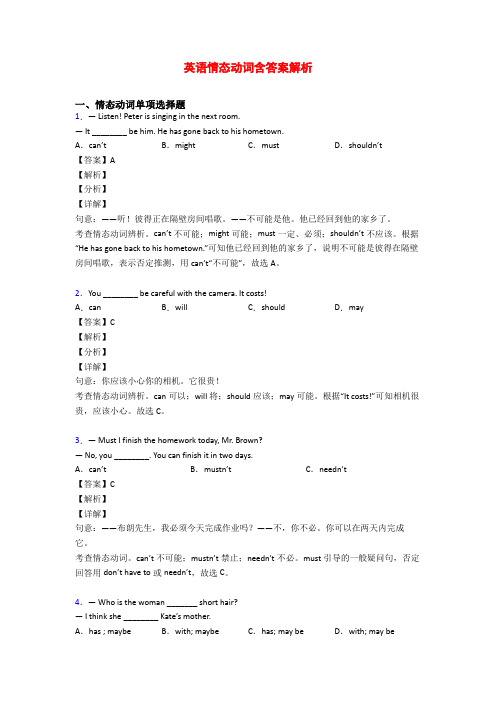
英语情态动词含答案解析一、情态动词单项选择题1.— Listen! Peter is singing in the next room.— It ________ be him. He has gone back to his hometown.A.can’t B.might C.must D.shouldn’t【答案】A【解析】【分析】【详解】句意:——听!彼得正在隔壁房间唱歌。
——不可能是他。
他已经回到他的家乡了。
考查情态动词辨析。
can’t不可能;might可能;must一定、必须;shouldn’t不应该。
根据“He has gone back to his hometown.”可知他已经回到他的家乡了,说明不可能是彼得在隔壁房间唱歌,表示否定推测,用can’t“不可能”,故选A。
2.You ________ be careful with the camera. It costs!A.can B.will C.should D.may【答案】C【解析】【分析】【详解】句意:你应该小心你的相机。
它很贵!考查情态动词辨析。
can可以;will将;should应该;may可能。
根据“It costs!”可知相机很贵,应该小心。
故选C。
3.— Must I finish the homework today, Mr. Brown?— No, you ________. You can finish it in two days.A.can’t B.mustn’t C.needn’t【答案】C【解析】【详解】句意:——布朗先生,我必须今天完成作业吗?——不,你不必。
你可以在两天内完成它。
考查情态动词。
can’t不可能;mustn’t禁止;needn’t不必。
must引导的一般疑问句,否定回答用don’t have to或needn’t,故选C。
4.— Who is the woman _______ short hair?—I think she ________ Kate’s mother.A.has ; maybe B.with; maybe C.has; may be D.with; may be【答案】D【解析】【分析】【详解】句意:——那个短发的女人是谁?——我想她可能是凯特的妈妈。
人教版必修三unit1情态动词训练题及答案
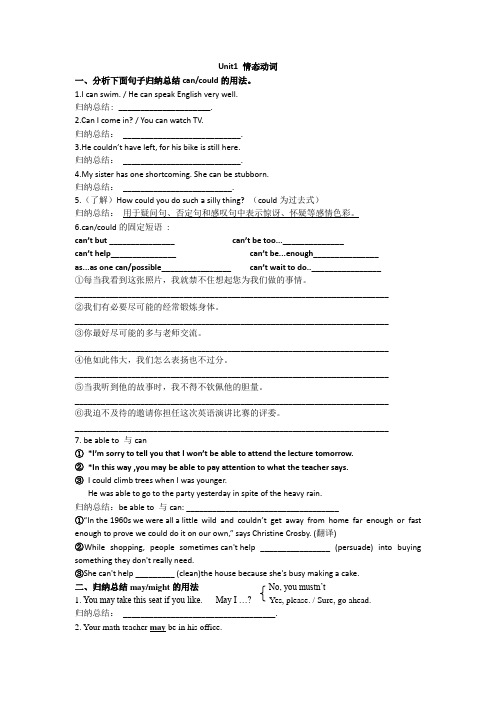
Unit1 情态动词一、分析下面句子归纳总结can/could的用法。
1.I can swim. / He can speak English very well.归纳总结: _____________________.2.Can I come in? / You can watch TV.归纳总结:___________________________.3.He couldn’t have left, for his bike is still here.归纳总结:___________________________.4.My sister has one shortcoming. She can be stubborn.归纳总结:_________________________.5.(了解)How could you do such a silly thing? (could为过去式)归纳总结:用于疑问句、否定句和感叹句中表示惊讶、怀疑等感情色彩。
6.can/could的固定短语:can’t but _______________ can’t be too...______________can’t help_______________ can’t be...enough_______________as...as one can/possible________________ can’t wait to do..________________①每当我看到这张照片,我就禁不住想起您为我们做的事情。
________________________________________________________________________②我们有必要尽可能的经常锻炼身体。
________________________________________________________________________③你最好尽可能的多与老师交流。
情态动词练习(含答案)
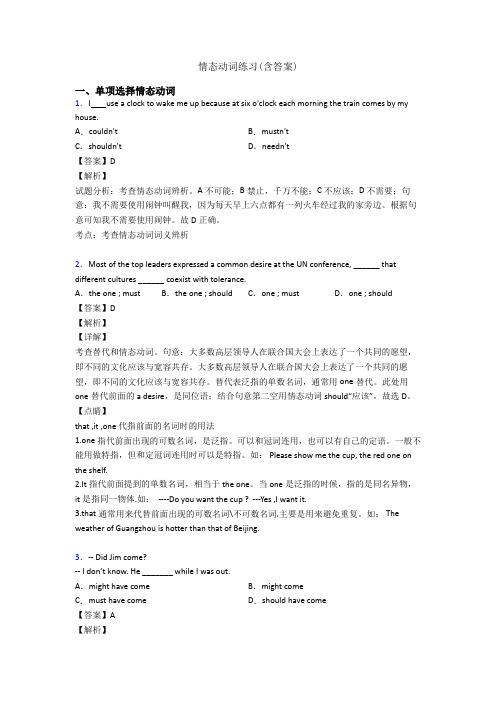
情态动词练习(含答案)一、单项选择情态动词1.I use a clock to wake me up because at six o'clock each morning the train comes by my house.A.couldn't B.mustn'tC.shouldn't D.needn't【答案】D【解析】试题分析:考查情态动词辨析。
A不可能;B禁止,千万不能;C不应该;D不需要;句意:我不需要使用闹钟叫醒我,因为每天早上六点都有一列火车经过我的家旁边。
根据句意可知我不需要使用闹钟。
故D正确。
考点:考查情态动词词义辨析2.Most of the top leaders expressed a common desire at the UN conference, ______ that different cultures ______ coexist with tolerance.A.the one ; must B.the one ; should C.one ; must D.one ; should【答案】D【解析】【详解】考查替代和情态动词。
句意:大多数高层领导人在联合国大会上表达了一个共同的愿望,即不同的文化应该与宽容共存。
大多数高层领导人在联合国大会上表达了一个共同的愿望,即不同的文化应该与宽容共存。
替代表泛指的单数名词,通常用one替代。
此处用one替代前面的a desire,是同位语;结合句意第二空用情态动词should“应该”。
故选D。
【点睛】that ,it ,one 代指前面的名词时的用法1.one 指代前面出现的可数名词,是泛指。
可以和冠词连用,也可以有自己的定语。
一般不能用做特指,但和定冠词连用时可以是特指。
如: Please show me the cup, the red one on the shelf.2.It 指代前面提到的单数名词,相当于the one。
英语情态动词含答案解析
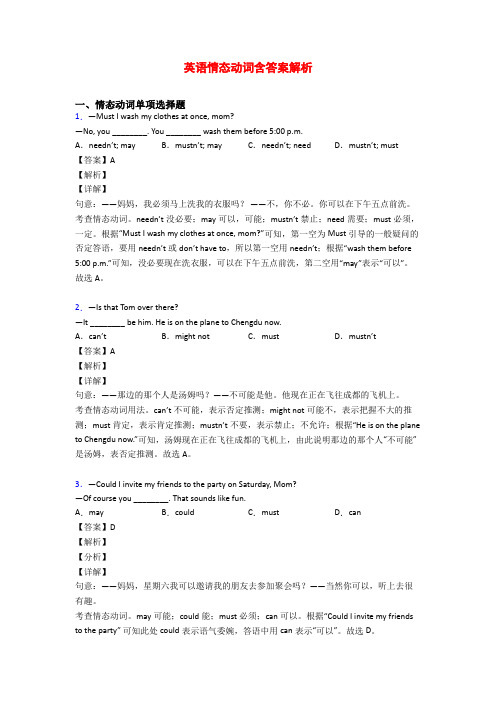
英语情态动词含答案解析一、情态动词单项选择题1.—Must I wash my clothes at once, mom?—No, you ________. You ________ wash them before 5:00 p.m.A.needn’t; may B.mustn’t; may C.needn’t; need D.mustn’t; must【答案】A【解析】【详解】句意:——妈妈,我必须马上洗我的衣服吗?——不,你不必。
你可以在下午五点前洗。
考查情态动词。
needn’t没必要;may可以,可能;mustn’t禁止;need需要;must必须,一定。
根据“Must I wash my clothes at once, mom?”可知,第一空为Must引导的一般疑问的否定答语,要用needn’t或don’t have to,所以第一空用needn’t;根据“wash them before 5:00 p.m.”可知,没必要现在洗衣服,可以在下午五点前洗,第二空用“may”表示“可以”。
故选A。
2.—Is that Tom over there?—It ________ be him. He is on the plane to Chengdu now.A.can’t B.might not C.must D.mustn’t【答案】A【解析】【详解】句意:——那边的那个人是汤姆吗?——不可能是他。
他现在正在飞往成都的飞机上。
考查情态动词用法。
can’t不可能,表示否定推测;might not可能不,表示把握不大的推测;must肯定,表示肯定推测;mustn’t不要,表示禁止;不允许;根据“He is on the plane to Chengdu now.”可知,汤姆现在正在飞往成都的飞机上,由此说明那边的那个人“不可能”是汤姆,表否定推测。
故选A。
3.—Could I invite my friends to the party on Saturday, Mom?—Of course you ________. That sounds like fun.A.may B.could C.must D.can【答案】D【解析】【分析】【详解】句意:——妈妈,星期六我可以邀请我的朋友去参加聚会吗?——当然你可以,听上去很有趣。
英语情态动词含答案解析
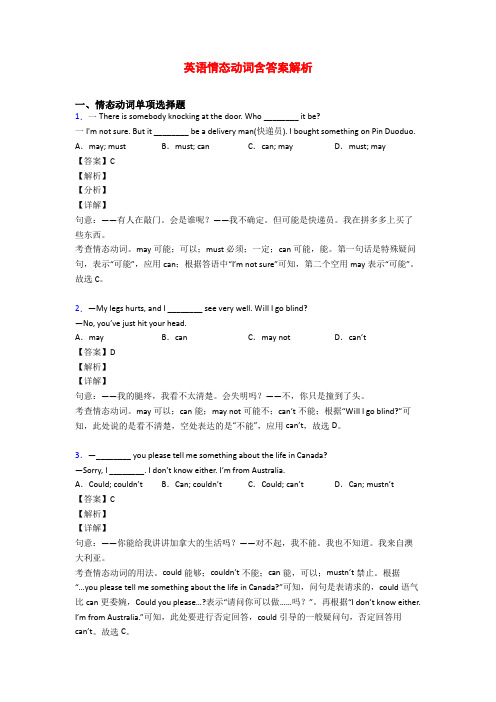
英语情态动词含答案解析一、情态动词单项选择题1.一There is somebody knocking at the door. Who ________ it be?一I'm not sure. But it ________ be a delivery man(快递员). I bought something on Pin Duoduo. A.may; must B.must; can C.can; may D.must; may【答案】C【解析】【分析】【详解】句意:——有人在敲门。
会是谁呢?——我不确定。
但可能是快递员。
我在拼多多上买了些东西。
考查情态动词。
may可能;可以;must必须;一定;can可能,能。
第一句话是特殊疑问句,表示“可能”,应用can;根据答语中“I’m not sure”可知,第二个空用may表示“可能”。
故选C。
2.—My legs hurts, and I ________ see very well. Will I go blind?—No, you’ve just hit your head.A.may B.can C.may not D.can’t【答案】D【解析】【详解】句意:——我的腿疼,我看不太清楚。
会失明吗?——不,你只是撞到了头。
考查情态动词。
may可以;can能;may not可能不;can’t不能;根据“Will I go blind?”可知,此处说的是看不清楚,空处表达的是“不能”,应用can’t,故选D。
3.—________ you please tell me something about the life in Canada?—Sorry, I ________. I don’t know either. I’m from Australia.A.Could; couldn’t B.Can; couldn’t C.Could; can’t D.Can; mustn’t【答案】C【解析】【详解】句意:——你能给我讲讲加拿大的生活吗?——对不起,我不能。
英语情态动词题20套(带答案)含解析
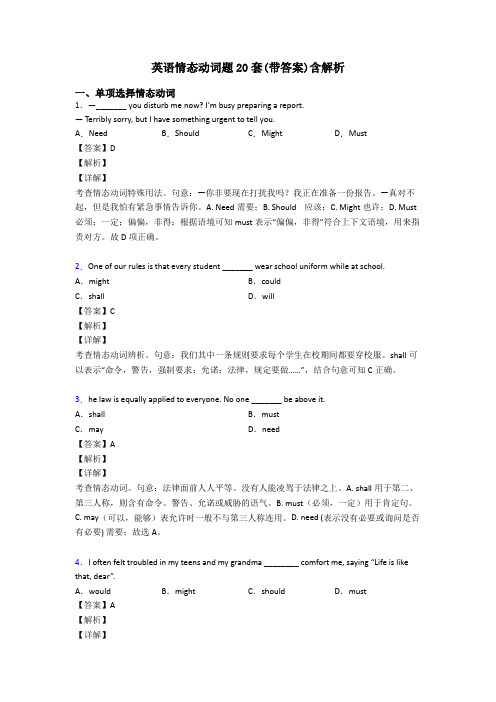
【解析】
【详解】
考查must have done结构。句意:——吉姆一定觉得我说的话很让人烦,尽管他什么也没说。——所以你是说你得向他道歉?根据“though he didn’t say anything.”可知此处表示对过去事情的肯定推测,用must have done表示“过去一定做了……”,故D项正确。
2、should作为情态动词,可以用在条件状语从句中,表示语气较强的假设,译作“万一”、“竟然”,这时也可将should置于从句之首,即将should放在主语前面,而省略从属连词if。例如:If you should fail to come, ask Mrs Chen to work in your place.(= Should you fail to come, ask Mrs Chen to work in your place.)
A.mayB.canC.mustD.ould
【答案】C
【解析】
【详解】
考查情态动词表猜测的用法。句意:一定是汤姆把车停在这儿的,因为他是唯一有车的人。A. may可能;B. can可能;C. must一定;D. should应该。由as he is the only one with a car.可知一定是他把车停在这里的,非常有把握的肯定推测,故选C。
2.One of our rules is that every student _______ wear school uniform while at school.
A.mightB.could
C.shallD.will
【答案】C
【解析】
【详解】
考查情态动词辨析。句意:我们其中一条规则要求每个学生在校期间都要穿校服。shall可以表示“命令,警告,强制要求;允诺;法律,规定要做……”,结合句意可知C正确。
情态动词测试题及答案
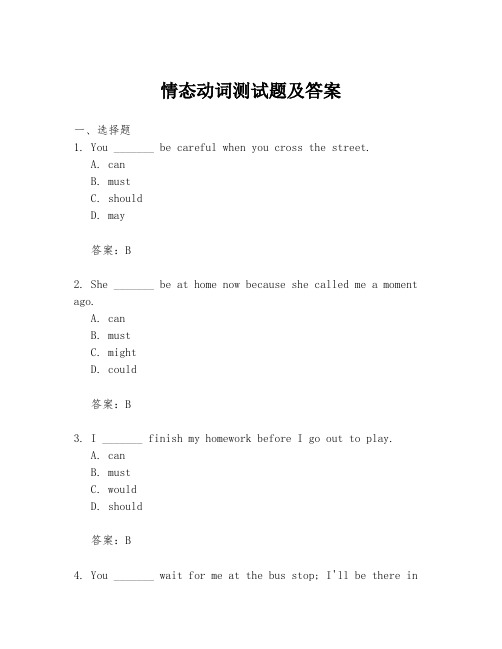
情态动词测试题及答案一、选择题1. You _______ be careful when you cross the street.A. canB. mustC. shouldD. may答案:B2. She _______ be at home now because she called me a moment ago.A. canB. mustC. mightD. could答案:B3. I _______ finish my homework before I go out to play.A. canB. mustC. wouldD. should答案:B4. You _______ wait for me at the bus stop; I'll be there infive minutes.A. needB. mustC. canD. may答案:C5. They _______ have finished their work by now.A. canB. mustC. shouldD. might答案:C二、填空题6. It’s cold outside. You _______ wear a coat.答案:should7. The doorbell rang, _______ it be the postman?答案:could8. _______ you tell me the way to the library?答案:Could9. I _______ go to the party, but I have to finish my report first.A. canB. mustC. wouldD. should答案:C10. _______ I borrow your pen for a moment?答案:May三、改错题11. He can go to the concert, but he must to stay at home.错误:to stay正确:must stay12. She might have finished her work, but I think she should be working now.错误:might have finished正确:may have finished13. You should to call your parents before you leave.错误:to call正确:should call14. I would like to go to the beach, but I can’t afford it.错误:would like正确:could15. They must have been at the meeting, but they were actually at the cinema.错误:must have been正确:could have been四、翻译题16. 他可能已经完成了他的作业。
英语情态动词专题练习(及答案)含答案

英语情态动词专题练习(及答案)含答案一、选择题1.— Zoe, what do you think is the greatest advantage of shopping online?— At least I ______ spend much time going from shop to shop.A.shouldn’t B.can’t C.needn’t D.mustn’t2.To my joy, we_________ go to the bank. Mary has lent us some money.A.shouldn’t B.needn’t C.couldn’t D.wouldn’t 3.—Hurry up, Jack! Let’s cross the road as fast as possible.—No, you ________. Don’t you see the light is still red?A.couldn’t B.wouldn’t C.mustn’t D.needn’t 4.—The high school entrance examination is coming!— Yes, our teacher tells us we ________ be too careful while taking exams.A.mustn’t B.shouldn’t C.needn’t D.can’t5.We shouldn’t throw any objects from the building. Even a small object ________ cause serious injuries or death, when dropped from a great height.A.must B.should C.may D.need6.Our Chemistry teacher always tells us we ________ be too hardworking before the exams. A.mustn’t B.shouldn’t C.needn’t D.can’t 7.—Dad, must we wait until the light becomes green?—Yes, I am afraid we ________. That’s the traffic rule.A.may B.can C.have to D.need8.—________ you give me a hand? I can’t put up the poster by myself.—No problem.A.Could B.Should C.Need D.Must 9.Exercise is helpful but it ________ be regular (规律的) exercise.A.must B.may C.can D.need10.You'd better __________ hard from now on, __________ you will fail the exam. A.work; and B.working; or C.working; and D.work; or 11.—Where is Tom? I am considering ________ him about the result of the exam.—Oh. You ________. He has known it already.A.to tell; can't B.telling; needn't C.tell; mustn't D.told; shouldn't 12.It’s of great importance to protect the environment. Each of us ________ take an active part in it.A.can B.may C.would D.should13.If you buy your mum an iRobot floor cleaner, she ________ sweep the floor every day. A.can’t B.mustn’t C.needn’t D.shouldn’t 14.—Who’s singing next door? Is it Miss Wang?—It ________ be her. She’s having the board meeting.A.can’t B.shouldn’t C.mustn’t D.needn’t15.The boy is very brave.I ________ he ________ the tall tree.A.dare say; dares to climbB.dare to say; dare climbingC.dare saying; dares climbD.dare to say; dares climbed16.—The high school entrance examination is coming!—Yes, our teacher tells us we _______ be too careful while taking exams.A.mustn't B.shouldn't C.needn't D.can't17.---Will you be back early this evening?---Yes, but I ________ be a little late. Our boss sometimes has extra work for us.A.may B.must C.need D.will 18.—Amy, I hear you've got many foreign coins._______ I have a look?—Of course, I'll fetch them for you.A.May B.MustC.Should D.Need19.When I was young, my father ___________ take me to climb the hill which was not far from our house.A.may B.must C.would D.should20.You ______ pay too much attention to your pronunciation, as it is so important in the oral (口头的) test.A.shouldn’t B.mustn’t C.can’t D.needn’t 21.—Shall we go camping this summer holiday?—Nothing________be better.A.should B.could C.must D.may 22.—Would you please________in that way? That’s not s afe!—Sorry. I won’t do it any more.A.not driving B.not to drive C.no driving D.not drive 23.Think twice before making a decision, or you __________ get into trouble.A.may B.can't C.shouldn't D.mustn't 24.Don’t cross the road until the traffic lights tur n green. A car_______hit you.A.need B.may C.should D.must25.When you visit a museum, some instructions should ________ and we’d better not________ them.A.pay attention to; be against B.be paid attention; againstC.be paid attention to; against D.be paid attention to; be against 26.—Seventy dollars for such a dress! You ________ be joking!—I’m serious. It’s made of silk from Hangzhou.A.must B.need C.will D.can27.—Who is singing next door? It sounds like a young girl’s voice.—It _________ be Jane. But she seldom sings English songs.A.need B.must C.may D.can28.To avoid ________, we’d better ________ the parents’ meeting online.A.gather; hold B.gathering; hold C.gather; holding D.to gather; to hold 29.—I must go to school today, ________?—No, you ________.You can go as soon as you get well.A.mustn’t I;needn’t B.needn’t I;needn’tC.mustn’t I;mustn’t D.needn’t I;mustn’t30.—How do you like my new dress?—Well, if I ________ say, it is not suitable for you.A.may B.must C.have to D.should 31.— Excuse me, could you tell me where the Nanjing Brocade Museum is?—Go along this road for five minutes. You ________ miss it. It’s a huge building. A.mustn’t B.can’t C.needn’t D.shouldn’t 32.—Must the children leave at six tomorrow morning?—No, they _______. They can have more time to get ready for the trip.A.can’t B.needn’t C.mustn’t D.may not 33.—Why didn’t you tell it to me earlier?— Why ________ I? I want to have my own secret.A.can B.may C.should D.shall34.—Is that Mr Zhou?—It ________ be him. He has gone to Beijing.A.can B.may C.can’t D.shouldn’t 35.Most young people like shopping online because they ________ spend much time going from shop to shop.A.needn’t B.can’t C.mustn’t D.shouldn’t 36.—Is it usually warm in Yancheng in May?—Yes. But it _______ be rather cold sometimes.A.must B.should C.would D.can37.—Do we have to finish this today?—Yes, you ________ . Today is the last day.A.would B.may C.can D.must 38.—Will dad arrive home at 6 o’clock to have dinner with us this evening?— I think he will, but he ________ not. Sometimes he works extra hours.A.can B.must C.need D.may39.—Is it really necessary for me to go shopping with a mask on?—I’m afraid you ________ in public. It is not only to protect yourself but also to protect others. A.must B.should C.can D.need 40.Cars ________ give way to walkers on some roads in Binhai, or the drivers will be fined. A.may B.will C.can D.must 41.—Could you tell me how to renew the library books?—With pleasure. You ________ come to our desk every time. It’s easier to renew them online. A.can’t B.mustn’t C.needn’t D.shouldn’t 42.For the safety of the passengers, objects like guns ________ be carried on board.A.may not B.needn’t C.might not D.mustn’t 43.—The article says that a person’s animal sign decides his personality.—You ________ read it for fun, but don’t believe in that.A.can B.must C.shouldn’t D.needn’t 44.—Mum, I bought some strawberries on my way home.—Oh, you’re so sweet. But the strawberries ________ be put into the fridge for freshness. A.must B.can C.may D.need45.—In China, many students have to stay up late to do their homework.—No worries. The government has realized the problem. I’m sure there ________ be good news soon.A.can B.should C.must D.need46.—________ I see your ID card? We have to check your personal information.—Sure. Here you are.A.May B.Need C.Should D.Must47.—I don’t care what people think.—Well, you _______ . Some opinions are worth weighing.A.should B.might C.could D.would48.You ________ drive after drinking alcohol(酒). It’s against the law.A.mustn’t B.needn’t C.couldn’t D.wouldn’t49.—I think they are enough. We ________ make so many chairs.—I don’t think so. Because nearly a quarter of them need ________.A.don’t need to; mending B.needed; to be mendedC.don’t ne ed; mend D.need; to mend50.—Shall I tell him the change of the time right now?—I’m afraid you ________, otherwise he will be late for the meeting.A.can B.may C.must D.need【参考答案】***试卷处理标记,请不要删除一、选择题1.C解析:C【详解】句意:——佐伊,你认为网上购物最大的优势是什么?——至少我不需要花很多时间逛商店。
(完整版)情态动词专项练习(含答案)
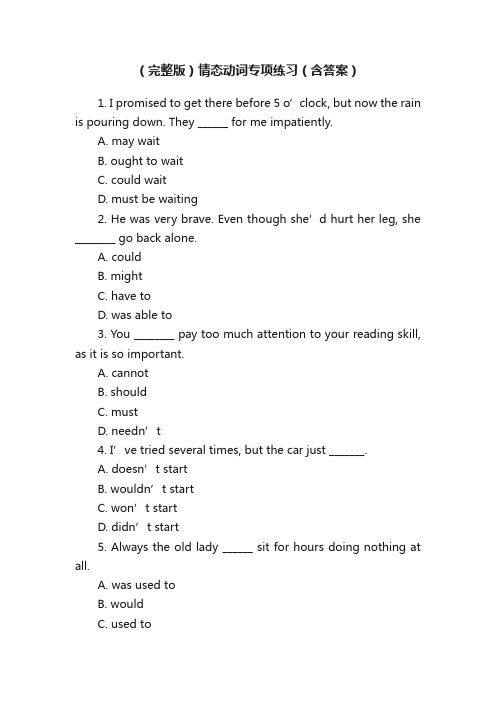
(完整版)情态动词专项练习(含答案)1. I promised to get there before 5 o’clock, but now the rain is pouring down. They ______ for me impatiently.A. may waitB. ought to waitC. could waitD. must be waiting2. He was very brave. Even though she’d hurt her leg, she ________ go back alone.A. couldB. mightC. have toD. was able to3. You ________ pay too much attention to your reading skill, as it is so important.A. cannotB. shouldC. mustD. needn’t4. I’ve tried several times, but the car just _______.A. doesn’t startB. wouldn’t startC. won’t startD. didn’t start5. Always the old lady ______ sit for hours doing nothing at all.A. was used toB. wouldC. used toD. should6. There used to be a small school,___________?A. was thereB. wasn’t itC. usedn’t thereD. usedn’t it7. Our house is on the top of the hill, so in summer the wind _____ be pretty cold.A. mustB. canC. ought toD. need8. Haven’t I told you that you __________ have the ans wer tomorrow morning?A. willB. shallC. shouldD. would9. I’m surprised that he _______ in the match.A. should failB. should have failedC. would have failedD. may have failed10. Better go to see my sick colleague right now, ________I?A. hadn’tB. didn’tC. don’tD. won’t11. Sir, you ______ be hunting deer here, for they are preserved by the government.A. oughtn’t toB. can’tC. won’tD. needn’t12. Sorry I’m late. I ______ have turned off the alarm clock and gone back to sleep again.A. mightB. shouldC. canD. will13. —There were already five people in the car, but they managed to take me as well.— It __________ a comfortable journey.A. can’tB. shouldn’t beC. must have beenD. couldn’t have been14. To be on the safe side, we should fill up the tank now, because we ______ run out of gas on the way.A. canB. wouldC. mightD. should15. ____ three people who travel together, there _____ be at least one who ____ be my teacher.A. Between; can; willB. In; should; couldC. Among; will; mayD. Of; must; can16. —Could you lend me that book you ______ me aboutwhen I telephoned you?—No, I am sorry, I can’t. I gave it to a friend.A. were tellingB. would tellC. had toldD. had been telling17. —We need a person badly to think up such an idea.—_______ the new comer have a try?A. ShallB. MayC. ShouldD. Need18. We ________ so tired. We’ve only been to a party.A. mustn’t have feltB. wouldn’t have feltC. shouldn’t have feltD. couldn’t have felt19. Professor Smith, many students want to see you. __________ they wait here or outside?A. DoB. ShallC. WillD. Would20. —How about paying a visit to Mr. Richardson, our former history teacher?—Good idea. I will e-mail him today so he _____know _________ to expect us.A. shall; whyB. may; whenC. would; whyD. will; how21. —I went to work on foot yesterday, though it _________ cats and dogs.—You __________ by bus. It was likely to get a cold.A. is raining; must have goneB. rained; would goC. was mining; should have goneD. have rained; could have gone22. You ______ pay too much attention to your reading skill, as it is so important.A. cannotB. shouldC. mustD. needn’t23. I told Sally to fix him up with this job, but perhaps I _________ it out for her.A. had to writeB. must have writtenC. should have writtenD. ought to write24. My sister met him at the Grand Theatre yesterday afternoon, so he ________ your lecture.A. couldn’t have attendedB. needn’t have attendedC. mustn’t have attendedD. shouldn’t have attended25. Research findings show we spend about two hours dreaming every night, no matter what we ________ during the day.A. should have doneB. would have doneC. may have doneD. must have done26. —Is there any flight to Tokyo today?— I think there _____, for the weather is too bad.A. mustn’t beB. mightn’t beC. needn’t beD. can’t be27. —I’m told that John had another car accident this morning.— I believe not. He _____ so careless.A. shouldn’t have beenB. wouldn’t have beenC. couldn’t have beenD. mustn’t have be en28. It was playing computer games that cost the boy a lot of time that he __________ doing his lessons.A. might have spentB. ought to have spentC. must have spentD. could have spent29. —I didn’t know you were good friends.—You _______. I have known her since she moved here. You were studying abroad then.A. may haveB. needn’t haveC. couldn’t haveD. must have30. They must have finished the work by the end of last month, __________?A. mustn’t theyB. haven’t theyC. hadn’t theyD. didn’t they31. —I didn’t see her yesterday.— Of course, you _____, because he had gone for a trip.A. can’tB. may not haveC. can’t haveD. mustn’t have32. You ________ phone him if you want to, but you _________. He is sure to phone you.A. may; mustn’tB. have t o; needn’tC. can; doesn’t needD. can; needn’t33. — She must have gone back to the valley.— ______, she _____ have. The entrance to it was nowhere to be found.A. No; mustn’tB. Yes; mightC. Yes; couldD. No; couldn’t34. He _____ full marks, but he was so careless as to make a spelling mistake.A. must have gainedB. can have gainedC. could have gainedD. must gain35. From what you said, she _____ you about it.A. mustn’t have toldB. can’t have toldC. mustn’t tellD. can’t tell36. — You ought to have made an apology to Tom yesterday evening.— Yes, I know I _________.A. ought toB. have toC. should haveD. must have37. —Is there a fog in the evening?—There _______ be. I’ll make a phone call to find it out.A. mustB. wouldC. willD. might38. — _______ he help you with the problem?—Well, though it is very hard, __________ I’ll do what I can to work it out.A. Shall; butB. Can; andC. Must; howeverD. Will; still39. —How is that, Joan?—Yeah, it’s from the boss. She _________ first, whether she likes it.A. shall goB. ought to have goneC. should goD. must have gone40. —Would you like to watch the video, in which you can see foreigners making jiaoji during the Spring Festival?—Sure, it ______ be very interesting.A. shouldB. mayC. canD. will41. —The door was open.—It _________ open. I had locked it myself and the key was in my pocket.A. can not beB. must not beC. can not have beenD. must not have been42. —Where ________ Margaret have put the empty bottles?—She ________ them away. They must be somewhere.A. can; can’t have thrownB. must; needn’tC. must; must have thrownD. cant; must throw43. —Mum, I climbed to get the Teddy Bear from the top of the shelf.—My goodness! You _______ yourself. You ______ do that next time.A. mu st have hurt; mustn’tB. should have hurt; can’tC. may have hurt; mustn’tD. might have hurt; won’t be able to44. —Shall I go and buy more food and drinks for the party?—No, we have prepared a fridge of those. That _______ be quite enough.A. canB. mayC. mightD. ought to45. —Hurry up, Michael! It’s ten to three.—Goodness me! The class_______. I’ll be late again.A. must beginB. may beginC. should have begunD. must have begun46. When he was there, he ____ go to that coffee shop at the street comer after work every day.A. wouldB. shouldC. had betterD. might47. —I hear you have written a novel.—Yes, the book ________ be out in a month or so.A. canB. dareC. shouldD. need48. —How could I thank you enough?—Don’t mention it. Any other man _________ that.A. must doB. could doC. would have doneD. should have done49. —Why aren’t they here yet?—They ________ the bus.A. can have missedB. must be late forC. may have missedD. might be late for50. Mike _______ come to see me I don’t want to go out in case he comes.A. canB. mustC. mayD. will51. The thief ________ in from the kitchen window as the door was closed.A. may climbB. must have climbedC. could have climbedD. should have climbed52. —You didn’t invite Bill?— __________ him too?A. Must I inviteB. Must I have invitedC. Should I inviteD. Should I have invited53. —Why didn’t you attend the lecture yesterday?—I didn’t think that we _______ on Sundays.A. shouldB. ought to haveC. shouldn’t haveD. will have to54. It’s said that there are plenty of hotels in that town. There ______ be any difficulty for you to find somewhere to stay.A. wouldn’tB. mustn’tC. shouldn’tD. needn’t55. —Would you be here to attend the English party this evening?—Yes, we _________.A. shallB. wouldC. willD. must56. On Sundays when I was a child, Father and I _______ get up early and go fishing.A. couldB. wouldC. mightD. should57. —You’d better keep quiet in class.—Sometimes I ________ Yesterday, I was very quiet during my English class.A. wouldB. doC. didD. have58. I lived with my sister this summer and didn’t have to pay rent. So I ______ save most of my salary.A. couldB. wouldC. was able toD. should59. —Look, John’s fallen asleep.— Oh, he _______ too late last night.A. might sit upB. should have sat upC. could sit upD. must have sat up60. —I posted the letter a week ago.—Then they __________ the letter by now. It usually takes four days.A. can have receivedB. must receiveC. should receiveD. ought to have received61. He used to teach in that university and I _________ ride past it on my way to work.A. wouldB. couldC. shouldD. might62. —So you have to leave now.—Yes, I __________.—How nice it would be if you could stay a bit longer!A. have toB. ought toC. doD. have63. He _______ Shanghai, for I saw him talking with the headmaster a moment ago.A. must have gone toB. can’t have gone toC. mustn’t have been toD. can’t have been to64. From what I learn about their hotel, the service and the weather, they _____ their holiday very much.A. wouldn’t have enjoyedB. shouldn’t have enjoyedC. needn’t have enjoyedD. can’t have enjoyed65. It is not like Jack to be unfriendly, so he _________ you when you called.A. can’t have seenB. should not have seenC. must not have seenD. need not have seen66. —Many people in England love to give advice on weather reporting.—Yes, but I think the weather office’s computers _________ be more accurate.A. canB. mustC. ought toD. might67. —The farmers lived near the high way.—________ very noisy.A. It must have beenB. They must beC. That might beD. There must be68. She is too slow. She ________ pass the test, but she __________ too little.A. would; knewB. will; knowsC. would; knowsD. will; knew69. —Mary didn’t turn up last time, did she?—No. She_________. We had changed our plan.A. shouldn’t have comeB. needn’t have to comeC. didn’t need to comeD. needn’t have come70. —They haven’t finished the work up to now.—Well, they________.A. shouldB. should haveC. wouldD. must have71. —Shall I go and buy more fruit for the party?—No, I have already bought 3 baskets. That _________ be enough.A. canB. ought toC. mayD. might72. —Why hasn’t the speaker turned up?—He _________ the flight. I’ll find it out at once.A. must have missedB. might have missedC. would have missedD. could have missed73. I _______ pay Tom a visit, but I am not sure whether I will have time this Sunday.A. shouldB. mightC. wouldD. could74. —Who is the girl standing over there?— Well, if you _____ know, her name is Mabel.A. mayB. canC. mustD. shall75. It has been announced that candidates (考生)________ remain in their seats until all the papers have been collected.A. canB. willC. mayD. shall【答案解析】1.D。
人教版初中英语 语法练习题---情态动词。动词时态语态和非谓语动词基础测试题含答案
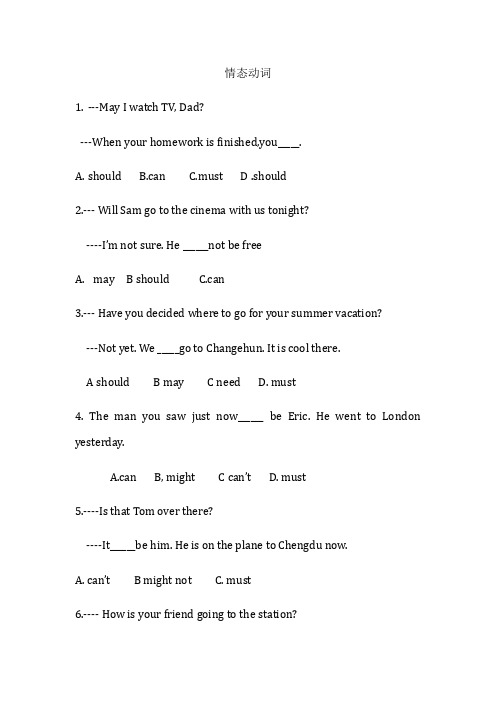
情态动词1.---May I watch TV, Dad?---When your homework is finished,you_____.A.shouldB.canC.must D .should2.--- Will Sam go to the cinema with us tonight?----I’m not sure. He ______not be freeA.may B should C.can3.--- Have you decided where to go for your summer vacation?---Not yet. We _____go to Changehun. It is cool there.A shouldB mayC need D. must4. The man you saw just now______ be Eric. He went to London yesterday.A.can B, might C can’t D. must5.----Is that Tom over there?----It______be him. He is on the plane to Chengdu now.A. can’t B might not C. must6.---- How is your friend going to the station?----I’m not sure. He ______take a taxi there.A. must B has to C. may7.Dirty air and water are harmful.They ______kill plants, and even people.A. canB. can’t C should D. shouldn't8. Every one of us______ always breathe the same breath and share the same future as the people.A. mightB. should C could9. The designer has tried every possible way to make the robot light, so you _____worry about its weight.A mustB mayC can'tD needn’t10.----Lily,________you finish the letter in ten minutes?----Yes. I canA mustB shouldC needD can11.The magazine ____ Lucy's. We can see her name on the coverA. mustn't beB. can’t beC. must beD. needn’t be12.Jerry didn’t pay me back, but he promised that he ______ this Sunday.A. mustB. couldC. wouldD. should13.— The summer vacation is coming. Have you made a plan for it? —Not yet. I ______ go to Guilin.A. mayB. canC. should14.—Try this soup - you _______ like it.— Wow! This is delicious.A. mustB. willC. shallD. can15.According to the notice, guests at this hotel_________ use the sports center at no extra cost.A. canB. shouldC. mustD. need16.He _________ like coffee. I see him drink a cup at times.A. mustB. mayC. can'tD. mustn’t17.Size and type do not matter — you________ do almost anything if you never give up.A. shouldB. mustC. needD. can18.You _____ always be careful with electricity for safety.A. mustB. canC. mustn’tD. can’t19.—______ I have a word with you, Mr. Green? It won't take long. —Okay.A. ShouldB. MayC. NeedD. Must20.—Must I finish this work at once?—No, you ______.A. can’tB. won’tC. needn’t21.—Mum, it’s too hot. _______ I swim in the lake?—No, you _______. That’s too dangerous!A. Should; can’tB. Need; mustn’tC. Must; needn’tD. Could; mustn’t22.As middle school students, we ______ follow the public rules wherever we go.A. wouldB. shouldC. mightD. could23.According to the rule,used batteries_______ be dropped in the red bin for harmful wastes.A.mustB.needC.canD.may24.You _____ walk on the wet hill path because you ______ fall and hurt yourself.A. must; might notB. mustn’t; mightC. needn’t; needD. must; must25.—I’ve got a toothache, mom.—Oh, you _____ eat too much candy.A.shouldn’tB. needn’tC. s houldD. need26.---_______I ask you a question,Mr.White?----Yes, please.A.MayB.ShouldC.MustD.Need27.---Must I do the project on my own?----No, you______. You can work with your classmates.A.can’tB.needn’tC.shouldn’tD.mustn’t28.We should keep quiet in the library.We______ speak loudly.A.mustB.mustn’tC. canD. needn’t29.---Look at the man standing at the school gate. Is he your math teacher Mr Brown?----No, it______be him. He has gone to Chengdu on business.A. needn'tB. can't C may not D. mustn't30. ---Are you going to the cinema tonight?----I don’t know. I______go or I_______stay at home.A will: willB must: mustC should: shouldD might: might31.---Yuan Longping,a famous Chinese scientist, is now doing research on sea rice.----If farmers_____ start planting rice in salty water China’s food supply will surely rise.A can B. can't C must D mustn’t32. There are no customers in that shop. I am sure the service_____be terrible.A canB must C, need D, might33.--- Where is Mom now?---I’m not sure. She______be in the kitchen.A. shall B may C must D need34.Nowadays, some robots are very human-like. They walk and danceA canB mustC needD have to35.---Dad,must I finish my homework today?---No, you______. You may do it tomorrow.A needn't B. mustn't C don’t D won’t36.---- May I smoke here, please?----I am afraid you______.This is a non-smoking areaA can B. can't C may D may not答案:1-5BABCA 6-10CABDD11-15CCABA 16-20BDABC21-25DBABA 26-30ABBBD31-35 ABBAA 36B时态、语态1. She’s brought you some eggs. As you know, she ______chickens.A. keepsB. will keepC. has keptD. kept2.—Daddy, when will we go out to fly a kite?—As soon as the rain ______.A. is stoppingB. stoppedC. will stopD. stops3.—We will go for a picnic if it ______ this Sunday.—Sounds great.A. won’t rainB. is sunnyC. will be sunny4. Each of us ______a life goal, which will guide us to a bright future.A. hasB. haveC. will haveD. had5. —He said he wanted to own a big farm.—Who ______ what he says? He is such a big mouth.A. knowsB. wondersC. caresD. remembers6. He ______ me his name, but I can’t remember it now.A. tellsB. will tellC. toldD. is telling7. He ______ his English teacher when he was sightseeing in Paris.A. has metB. had metC. metD. would meet8. —Wendy, how long have you had the Huawei P30 Pro?—A couple of days. I ______ it last week.A. boughtB. buyC. will buyD. have bought9. —My feelings for you have not changed.—But you have changed. You are not as you _____.A. areB. wereC. will beD. have been10. David is a tennis player. He_____to play tennis when he was six years old.A. beginsB. beginC. beganD. has begun11. —Tom, what’s your dad doing?—He ______ my bike.A. repairsB. will repairC. has repairedD. is repairing12. It ______. Please take an umbrella with you, Annie.A. rainsB. is rainingC. rainedD. was raining13. — I can’t find Sarah. Where is she?—She ______ for tomorrow’s Xingcheng Cup speaking competition at home.A. preparesB. will prepareC. is preparing14. —Hurry up!—One moment. I ______my e-mail and then I’m ready to go.A. readB. am readingC. was readingD. have read15. —What is your mother doing, Linda?—She ______ dinner in the kitchen now.A. is cookingB. was cookingC. cookD. cooking16. Peter with his classmates ______ for the bus when the earthquake happened.A. is waitingB. was waitingC. are waitingD. were waiting17. Sorry, I didn’t see you, because I ______ a picture.A. drawB. drewC. was drawingD. have drawn18. While the lights ______ to red, a car suddenly appeared round the corner.A. changeB. have changedC. were changingD. will change19. —I went to see you yesterday evening. But you weren’t in. Where were you then?—I ______a walk by the lake with my father.A. was havingB. am havingC. have had20. Amon ______ his ship in a big storm when a giant fish came out of the sea.A. will sailB. is sailingC. was sailingD. has sailed21. If you want to visit the Palace Museum, I______ tickets for you tomorrow.A. will bookB. bookedC. have bookedD. was booking22. —I’ve never seen Mr. Taylor before.—Don’t worry. I ______ him to you before the meeting.A. will introduceB. introducedC. have introducedD. had introduced23. —What is your plan for next weekend, Lingling?—I ______ volunteer work in the museum.A. was doingB. didC. have doneD. am going to do24. Next week, each student in the class ______ a small gift from their teachers.A. receivesB. receivedC. will receiveD. have received25. —You’d better take an umbrella. The weather report says it ______ in the afternoon.—Thank you. I will put one in my bag.A. will rainB. rainsC. is raining26. —It’s ten years since we came here.—How time flies! We ______in China for so long.A. workB. workedC. will workD. have worked27. Our school life ______ a lot since 2017. We have more activities now.A. changesB. changedC. will changeD. has changed28. —Look! My mother _____a new dress for me.—Wow, it looks very nice on you.A. is makingB. has madeC. will make29. My father _____ in a panda protection center for 10 years, so he knows a lot about pandas.A. was workingB. is workingC. has workedD. will work30. Melting ice (融冰) can cause sea levels to rise. Since 1993, sea levels _____ at a speed of 3.2 cm every 10 years.A. roseB. have risenC. rise31. —Where is Catherine? I haven’t seen her for days.—She ______Wuhan. She’ll be back next week.A. has gone toB. has been toC. have gone toD. have been to32. —Where are the teachers now?—In the meeting room. They ______ the meeting for 10 minutes. A. have begun B. have been onC. have hadD. have been held33. —Your new bike is so nice! When did you buy it?—In July. I ______ it for two weeks.A. hadB. have hadC. have boughtD. bought34. — Why won’t we play basketball with Class 4 this afternoon? — Because they ______ Longzhong for a study trip.A. have gone toB. have been toC. had gone toD. had been to35. I ate some fruit, which I ______since I was a child, and the vegetables from my garden.A. have enjoyedB. enjoyedC. enjoyD. had enjoyed36. The villagers expect that the building of the bridge ______before the rainy season comes.A. is completedB. was completedC. will be completedD. has been completed37. My advice on how to save paper ______ by my class last Monday.A. acceptsB. acceptedC. was acceptedD. is accepted38. It is said that one Greater Bay Area university ______ in Guangdong in the future.A. will be builtB. buildC. will buildD. is built39. These cakes ______with chocolate. Have one, please.A. fillB. filledC. are filledD. were filled40. — Perfect photos! Good skills!—Thank you. They ______ through my Huawei mobile phone. In fact, I am not skillful at all.A. tookB. were takenC. will be taken41. The China International Search and Rescue Team has brought help and hope to people in disasters around the world since it ______18 years ago.A. set upB. is set upC. was set upD. will be set up42. Gina went to the doctor’s yesterday and she _____ about the importance of good living habits once more.A. toldB. is toldC. was toldD. has told43. Unluckily, Notre Dame de Paris (巴黎圣母院) ______ this April. We felt so sad for that.A. was burntB. is burntC. has been burnt44. His car ______ five years ago, but it looks quite new.A. buysB. boughtC. is boughtD. was bought45. —The passenger refused to move after taking another one’s seat! —What a shame! He _____ according to the new credit system (诚信体系).A. punishB. punishedC. will punishD. will be punished46. —It’s reported that 31 of the brave young men _____ in a big forest fire in Sichuan.—I don’t know who they are, but I know who they are for.A. were killingB. were killedC. killedD. had killed47. —Tom is always careless with his schoolwork. Could you help him?—No problem! I think he ______to think twice before starting.A. should be toldB. shouldn’t be toldC. should tell48. —Lucy,what have you learnt from this history class?—Paper ______ first ______ about 2,000 years ago in China.A. is; inventedB. was; inventedC. is; inventingD. was; inventing49. In Chinese culture, children born in the Year of the Monkey _______to be smart.A. sayB. saidC. will be saidD. are said50. A baby’s first-month birthday is a special event in China and _______ with a special party.A. celebratesB. is celebratedC. was celebratedD. will celebrate51. —Oh, your room is too dirty, Mike!—Sorry, Mum. It _____ yesterday. I forgot to do it.A. didn’t cleanB. isn’t cleanedC. was cleanedD. wasn’t cleaned参考答案1.A2.D3.B4.A5.C6.C7.C8.A9.B 10.C 11.D 12.B 13.C 14.B 15.A 16.B 17.C 18.C 19.A 20.C 21.A 22.A23.D 24.C 25.A 26.D 27.D 28.B 29.C 30.B 31.A 32.C 33.B 34.A 35.A 36.C 37. C 38.A 39.C 40.B 41.C42.C 43.A 44.D 45.D 46.B 47.A 48. B 49. D 50.B 51. D非谓语动词Ⅰ.单项填空1.A lot of museums in China are worth . If you have time, you can choose to go.A.visitedB.visitingC.to visitD.visit2.It’s important for us a healthy lifestyle.A.to keepB.keepC.keepingD.kept3.I like the TV program The Reader best. I think we should spend as much time as we can in our spare time.A.readB.to readC.readingD.reads4.Young people are encouraged to work hard their owndreams.A.achieveB.achievesC.to achieveD.achieved5.—Look! There is a man Taiji near the river.—Wow! It’s my teacher, Mr. Wu.A.performB.performsC.performingD.performed6.—What a heavy rain!—So it is. I prefer rather than on such a rainy day.A.to go out; staying at homeB.staying at home; go outC.going out; stay at homeD.to stay at home; go out7.[2020·内江]—Don’t forget off the lights when you leave the classroom.—OK. I’ll do that.A.turnB.turnsC.turningD.to turn8.—In my opinion, animals shouldn’t be kept for fun.—I think so. Forests are the best places for animals .A.liveB.livingC.to livingD.to live in9.[2020·大庆]—What’s next?—I’ll have Tony you around.A.to showB.showC.showedD.shown10.with other people’s, my own problems seem worthless.pareparedparingpares11.[2020·盐城]The Birdwatching Society goes to Zhalong Nature Reserve the birds every year.A.to countB.countingC.countD.counts12.[2020·长沙改编]We are glad that traditional Chinese medicine can work wonders in preventing some diseases.A.knowB.to knowC.knowingD.knew13.[2020·泰州]More and more teenagers have poor eyesight, so parents and teachers should take action the situation from getting worse.A.stopB.stoppingC.stoppedD.to stop14.[2020·重庆B卷]We’d better follow the seven-step hand-washing method healthy.A.to keepB.keepC.keepingD.keeps15.Diana used to to work, but now she is used to , because the road is crowded and she wants to keep fit.A.drive; walkingB.drive; walkC.driving; walkD.driving; walking16.[2020·达州]Our government tries to do everything they canpeople live a better life.A.to helpB.helpC.helpingD.helped17.[2020·新疆]—Why don’t the doctors stop lunch?—Because they are busy a patient.A.to have; to saveB.having; savingC.to have; savingD.having; to save18.—I’m considering how to my new job. Any suggestions?—It’s only half an hour’s walk. I advise you .A.to go; not to driveB.going; to driveC.to go; not drivingD.going; not driving19.The twins are so alike that even their father finds it hard them from each other.A.tellB.tellsC.toldD.to tell20.—The movie Leap is wonderful. Do you feel like it tonight?—I’d love to, but my parents won’t let me out too late.A.watching; to stayB.to watch; stayingC.watching; stayD.to watch; to stay21.—Is Jack in the next room?—Well, it’s hard to say. But I heard him loud when I passed by just now.A.speakB.to speakC.spokenD.speaking22.Tiger Mom went out of the bedroom, her daughter crying sadly.A.leftB.leavingC.leavesD.has leftⅠ.用括号中所给单词的适当形式填空23.It is very important for children (learn) how to do chores at home.24.When I was free, I really enjoyed (walk) around the town.25.Squirrels always like saving some food before winter comes.But they forget where (find) it from time to time.26.All of us should look straight ahead and keep (run).27.(compare) with the old model, the new robot costs less but lasts longer.28.Please promise (not tell) lies any more, will you?29.What about (practice) swimming this summer vacation?30.You can’t imagine what difficulty I had (express) myself clearly at the beginning.31.I see these two boys (pass) my house every day.32.I am used to (drink) a glass of water after getting up every morning.Ⅰ.根据汉语意思完成句子,每空一词33.李明的愿望是成为一名警察。
初中英语人教新目标七年级下册Unit1情态动词can的用法练习题(附参考答案)
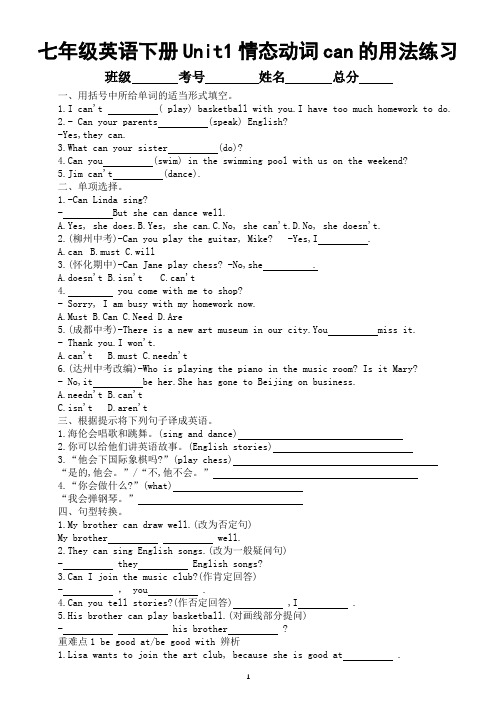
七年级英语下册Unit1情态动词can的用法练习班级考号姓名总分一、用括号中所给单词的适当形式填空。
1.I can't ( play) basketball with you.I have too much homework to do.2.- Can your parents (speak) English?-Yes,they can.3.What can your sister (do)?4.Can you (swim) in the swimming pool with us on the weekend?5.Jim can't (dance).二、单项选择。
1.-Can Linda sing?- But she can dance well.A.Yes, she does.B.Yes, she can.C.No, she can't.D.No, she doesn't.2.(柳州中考)-Can you play the guitar, Mike? -Yes,I .A.canB.mustC.will3.(怀化期中)-Can Jane play chess? -No,she .A.doesn'tB.isn'tC.can't4. you come with me to shop?- Sorry, I am busy with my homework now.A.MustB.CanC.NeedD.Are5.(成都中考)-There is a new art museum in our city.You miss it.- Thank you.I won't.A.can'tB.mustC.needn't6.(达州中考改编)-Who is playing the piano in the music room? Is it Mary?- No,it be her.She has gone to Beijing on business.A.needn'tB.can'tC.isn'tD.aren't三、根据提示将下列句子译成英语。
人教版英语情态动词专题练习(及答案)含解析
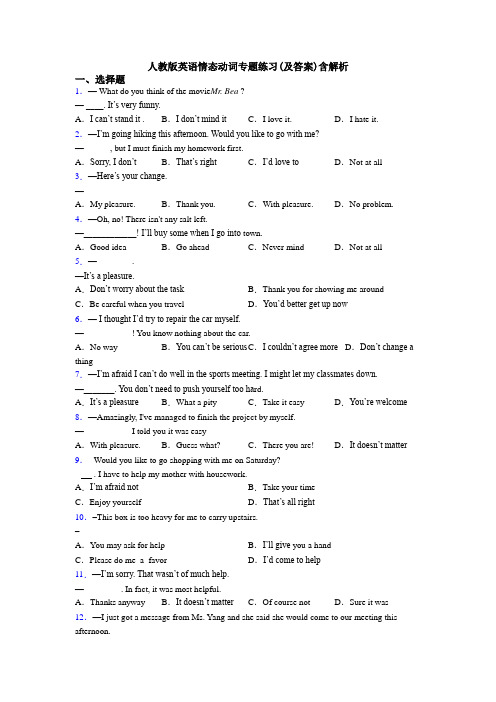
人教版英语情态动词专题练习(及答案)含解析一、选择题1.— What do you think of the movie Mr. Bea ?—____. It’s very funny.A.I can’t stand it .B.I don’t mind it C.I love it. D.I hate it. 2.—I’m going hiking this afternoon. Would you like to go with me?—______, but I must finish my homework first.A.Sorry, I don’t B.That’s right C.I’d love to D.Not at all 3.—Here’s your change.—________A.My pleasure. B.Thank you. C.With pleasure. D.No problem. 4.—Oh, no! There isn't any salt left.—____________! I’ll buy some when I go into town.A.Good idea B.Go ahead C.Never mind D.Not at all 5.—________.—It’s a pleasure.A.Don’t worry about the task B.Thank you for showing me aroundC.Be careful when you travel D.You’d better get up now6.—I thought I’d try to repair the car myself.— __________ ! You know nothing about the car.A.No way B.You can’t be serious C.I couldn’t agree more D.Don’t change a thing7.—I’m afraid I can’t do well in the sports meeting. I might let my classmates down.—_______. You don’t need to push yourself too ha rd.A.It’s a pleasure B.What a pity C.Take it easy D.You’re welcome 8.—Amazingly, I've managed to finish the project by myself.—___________I told you it was easyA.With pleasure. B.Guess what? C.There you are! D.It doesn’t matter 9.--Would you like to go shopping with me on Saturday?-- . I have to help my mother with housework.A.I’m afraid not B.Take your timeC.Enjoy yourself D.That’s all right10.–This box is too heavy for me to carry upstairs.–__________A.You may ask for help B.I’ll give you a handC.Please do me a favor D.I’d come to help11.—I’m sorry. That wasn’t of much help.— ________. In fact, it was most helpful.A.Thanks anyway B.It doesn’t matter C.Of course not D.Sure it was 12.—I just got a message from Ms. Yang and she said she would come to our meeting this afternoon.— She always has good ideas.A.Why not? B.What a pity! C.Time is up. D.That’ll be very nice. 13.-Do you think the rain will stop tomorrow?-_____. It has rained for four days. It’s too wet everywhere.A.I hope not B.I don’t think soC.Don’t worry D.I hope so14.—Can I look at the menu for a few more minutes before I decide?—Of course. ________, Sir.A.Make yourself at home B.Enjoy yourself C.It doesn’t matterD.Take your time15.—Would you like a small or a large bowl of noodles? —_______. I’m very hungry.A.A small bowl B.A large bowl C.Yes, please D.No, thanks16.-Do you mind telling me how to use this function? - . It’s easy. Just double-click on the “Pencil” icon.A.No, not at all B.Of course, I doC.Yes, I do D.Yes, I don’t17.—Would you please help me with my spoken English?—__________. First you should know practice makes perfect.A.That’s right B.No problem C.Quite well D.No, thanks 18.— Shall we go to Nanjing Green Expo Park to enjoy the beautiful flowers this afternoon?—________. Let’s go there by bike.A.I think so B.That’s all right C.My pleasure D.Sounds great 19.—I have got a new job as a presenter in the Wenzhou Radio Station!—________.A.Come on B.Good idea C.Congratulations D.All right 20.—TV says there will be a heavy rain tomorrow.—________. I planned to go climbing with my friend.A.Bad luck B.I hope so C.Good idea D.I don’t mind 21.—Sir, this is your order, two chicken hamburgers and a cup of coffee. ________—I’ll have the m here.A.For here or to go? B.Something to drink? C.Anything else? D.Is that OK? 22.—Do you like cartoons or scary movies?—_______. They can cheer me up.A.Yes, I do B.No, I don't C.Cartoons D.Scary movies 23.—I’m sorry I didn’t make it to your birthda y party last night.— ________ I know you are busy recently.A.Why not? B.Don’t mention it.C.No way. D.That’s all right. 24.—You seem so happy today, Jack.—________? I won the first prize in the singing competition yesterday.A.So what B.How come C.Guess what D.Why not25.—It’s been a wonderful party. Thank you very much?—- ________________.A.With pleasure B.No , thanks C.It’s OK D.I’m glad you enjoyed it .26.— Wow, what a good smell! Can I have a piece of cake?— ________A.No way. B.Good idea! C.HeIp yourself. D.What a pity! 27.—Could you help me look after my baby ________ I am away?—________.A.as; With pleasure B.while; My pleasure C.as; That’s all right D.while; With pleasure28.—How would you like your soup?—________.A.Very delicious B.With some tomatoes and eggs, pleaseC.I like it very much D.No, thanks29.—Time is up. I have to go now.—________ ! We don’t have more time to talk.A.That’s cool B.That’s the answer C.That’s a pity D.That’s good news 30.—Don’t keep the water running when y ou brush your teeth.— ________ .A.I hope so B.I’m afraid not C.Sorry, I won’t D.It’s nothing 31.—Would you mind if I open the window?—_______.We need fresh air.A.Not at all B.Yes, of course C.You’d better not D.That’s all right 32.—Only those who have a lot in common can get along well.—________ Opposites sometimes attract.A.I think so. B.I don’t think so.C.I don’t care.D.I hope so. 33.— Why will you take part in the charity walk? You are not good at running at all.— ________. I run to show that I can help others.A.Not exactly B.That’s not the point C.I can’t agree more D.It sounds like a pity 34.—Oh, my love, you say you have ordered a dozen cups of bubble tea (奶茶)?—________A.Agree. B.Forget it. C.I really do. D.Are you kidding me? 35.—I love the Internet. I’ve come to know many friends on the net.—________. Few of them would become your real friends.A.I can’t agree more B.I’m pleased to know thatC.That’s for sure D.That’s not the case36.—Hi, everybody! Here is the music.—________. Let’s d ance to the music.A.That’s no good B.Here we go C.That’s a shame D.Have a good time 37.—The game is too hard for me. I will certainly lose.—________. You should never say no before you try.A.Forget it! B.Come on! C.I’m sorry.D.Pardon me? 38.—I’ll be aw ay on a business trip. Would you mind looking after my cat?—Not at all. ________.A.It’s my pleasure B.I’d rather not.C.I’d like it.D.With pleasure. 39.—Why don’t you join in a club to practise speaking English?—________.A.That’s a good idea B.Never mind C.Yes, please D.Thank you 40.—I’ll have a chemistry exam tomorrow.—________!A.Well done B.Congratulations C.You’re welcome D.Good luck 41.—Summer camping gives children the chance to live away from home.—________. It is always good to help children grow up.A.That’s true.B.Come this way. C.Let me have a look. D.I don’t think we agree.42.—Thank you for helping to build hospitals during this special period.— ________ ! Many hands make light work.A.My pleasure B.All right C.Never mind D.None of my business43.—I visited the Purple Mountain Observatory by myself last Saturday.—________ Why didn’t you tell me earlier?A.You did? B.I hope not. C.Have a good time. D.I can’t believe it. 44.—Do you think you could finish this project without help?—________. This is not the first time for me.A.Take care B.Don’t worry C.Not exactly D.Hurry up 45.—We can invite Kate and Paul to Baohe Park with us.—________ I’ll give them a call right now.A.Why not? B.What for? C.What’s up?D.Are you kidding? 46.—Mum, Joe has broken a cup!—________. Accidents always happen.A.Pretty good B.Of course C.It doesn’t matter D.That depends 47.—We’ll study in different schools next term. I hope you’ll enjoy your time in the new school!—________A.I’ll take your advice. B.The same to you. C.Congratulations!D.It doesn’t matter.48.— The movie Lost in Russia sends a message about the importance of family.— ________. It reminds me of my parents.A.I hope so B.That’s all right C.You bet D.I don’t think so 49.— Are you feeling any better now after taking the medicine?—________. I’m feeling even worse.A.You got it B.Never mind C.Sorry to hear that D.Quite the opposite50.— Do you think Steve will pass the exam this time?— ________! He spends most of his time playing games on the phone.A.Promise B.No way C.Well done D.No problem【参考答案】***试卷处理标记,请不要删除一、选择题1.C【解析】本题考查日常用语。
英语情态动词练习题含答案
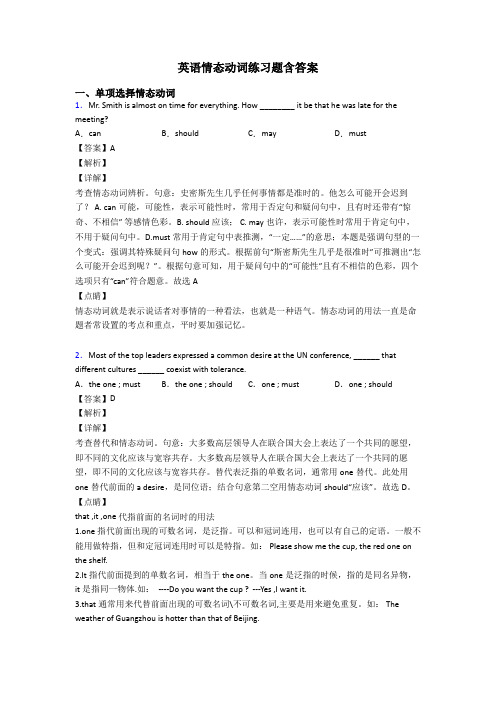
C.shouldD.will
【答案】B
【解析】
【详解】
考查情态动词。句意:——有一台计算机来储存照片真是太棒了。——不要过度依赖它。它有时候也会出故障,你最好做一个备份。计算机出故障这是可能的事情,表示客观可能性用can。must肯定,必须;should应该;will表意愿。故B选项正确。
11.-–Mary knows the city quite well.
--She______ well have been there before.
A.ne】D
【解析】
【分析】【详解】
考查情态动词辨析。句意:——Mary非常了解这个城市。——她肯定以前在那里呆过。may have done过去可能做过某事。表示对过去的肯定猜测。need have done本需要做某事却没做;could have done本可以做某事却没做;should have done本应该做某事却没做。故选D。
A.MayB.ShouldC.ShallD.Will
【答案】C
【解析】
【详解】
考查Shall的用法。句意:贝克先生,有些学生想见你。他们是在这里等还是在外面等?Shall用于第一、第三人称疑问句中,表示说话人征求对方的意见或向对方请示。故选C。
【点睛】
Shall的用法
Shall作为助动词,一般用于第一人称Ⅰ和We,表示一个将来的动作,构成将来时态。Shall后面接动词原形。例如:
【详解】
考查情态动词。句意:我们学校的校长最近通过了一项规定,要求学生在校园里穿校服。分析句子可知,“that students _______ wear school uniforms in our campus.”是同位语从句对名词“rule”内容解释说明。当表示强制,用于法令、条约、规章中,意为“必须,应该”等时句子用情态动词shall。故选D。
人教版中考英语专项训练情态动词专题(含答案)
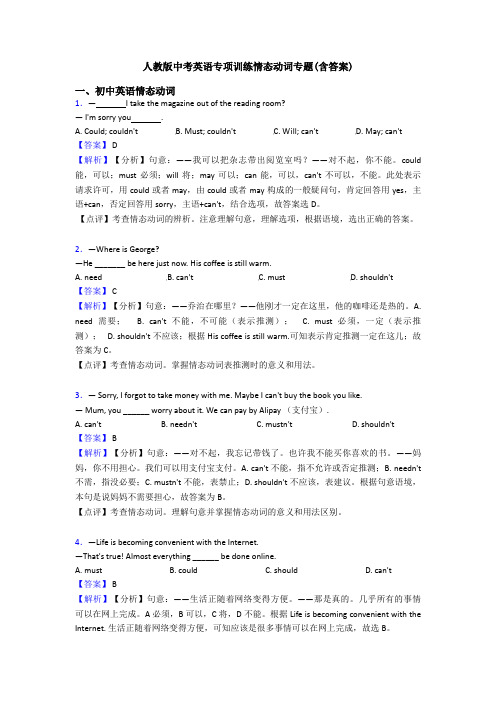
人教版中考英语专项训练情态动词专题(含答案)一、初中英语情态动词1.— I take the magazine out of the reading room?— I'm sorry you .A. Could; couldn'tB. Must; couldn'tC. Will; can'tD. May; can't【答案】 D【解析】【分析】句意:——我可以把杂志带出阅览室吗?——对不起,你不能。
could 能,可以;must必须;will将;may可以;can能,可以,can't不可以,不能。
此处表示请求许可,用could或者may,由could或者may构成的一般疑问句,肯定回答用yes,主语+can,否定回答用sorry,主语+can't,结合选项,故答案选D。
【点评】考查情态动词的辨析。
注意理解句意,理解选项,根据语境,选出正确的答案。
2.—Where is George?—He _______ be here just now. His coffee is still warm.A. needB. can'tC. mustD. shouldn't【答案】 C【解析】【分析】句意:——乔治在哪里?——他刚才一定在这里,他的咖啡还是热的。
A. need需要; B. can't 不能,不可能(表示推测); C. must 必须,一定(表示推测); D. shouldn't不应该;根据His coffee is still warm.可知表示肯定推测一定在这儿;故答案为C。
【点评】考查情态动词。
掌握情态动词表推测时的意义和用法。
3.— Sorry, I forgot to take money with me. Maybe I can't buy the book you like.— Mum, you ______ worry about it. We can pay by Alipay (支付宝).A. can'tB. needn'tC. mustn'tD. shouldn't【答案】 B【解析】【分析】句意:——对不起,我忘记带钱了。
人教版七年级英语下册 专项综合全练 情态动词can和特殊疑问句(含答案)
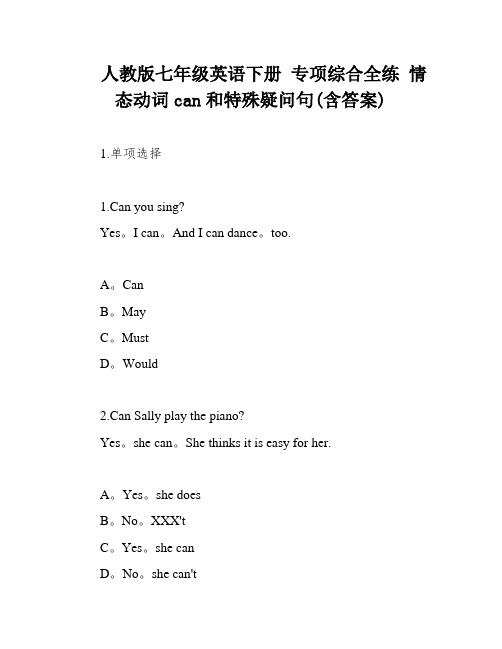
人教版七年级英语下册专项综合全练情态动词can和特殊疑问句(含答案)1.单项选择1.Can you sing?Yes。
I can。
And I can dance。
too.A。
CanB。
MayC。
MustD。
Would2.Can Sally play the piano?Yes。
she can。
She thinks it is easy for her.A。
Yes。
she doesB。
No。
XXX'tC。
Yes。
she canD。
No。
she can't3.What can you do。
Lin Tao?I can play badminton.A。
I XXX't run in the hallwaysB。
I want to join the music clubC。
XXXD。
I can play badminton4.Where is the bank。
sir?It is opposite the hospital。
on your left。
You can't miss it.A。
WhenB。
WhyC。
WhatD。
Where5.How did you get there?By train.A。
HowB。
WhatC。
WhenD。
How long6.How far is it from Hong Kong to Beijing? It's about 2,200 kilometers.A。
How longB。
How oftenC。
How far7.How often do you go to the library? XXX.A。
How farB。
How longC。
How muchD。
How often8.How will you get to the party tomorrow。
Betty?My mum will drive me there.A。
HowB。
情态动词专项练习(含答案和解析)

情态动词专项练习(含答案和解析)1.Our XXX.2.To my joy。
we don't need to go to the bank。
Mary has lent us some money.3.- Do we have to finish this today?Yes。
you must。
Today is the last day.4.Sorry。
smoking is not allowed here。
If you do。
you will be fined according to the rules.5.- Is it really necessary for me to wear a mask when shopping?I'm afraid you must in public。
It is not only to XXX.6.Hurry up。
or we will miss the beginning of the film.7.- How do you like my new dress?Well。
if I must say。
it is not suitable for you.8.- Do the children have to leave at six tomorrow morning?16."Please don't make so much noise。
I can't hear the speaker very well."17."We've discussed every detail of this plan and have got everything ready。
But still something may go wrong。
We still have to be very careful."18."XXX。
【英语】英语情态动词题20套(带答案)及解析
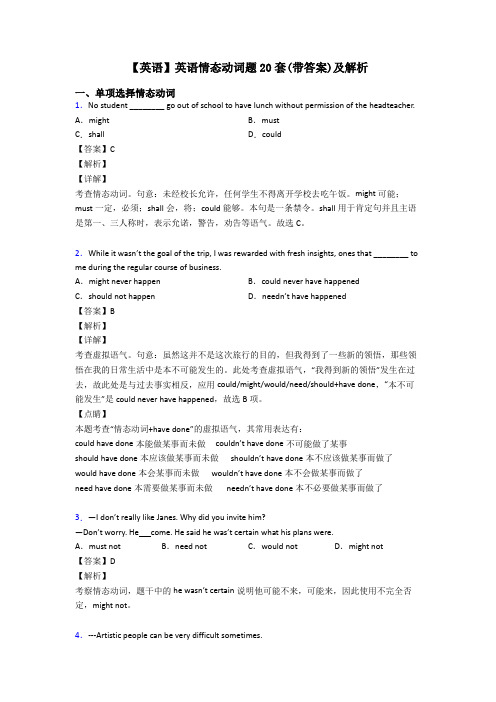
【英语】英语情态动词题20套(带答案)及解析一、单项选择情态动词1.No student ________ go out of school to have lunch without permission of the headteacher. A.might B.mustC.shall D.could【答案】C【解析】【详解】考查情态动词。
句意:未经校长允许,任何学生不得离开学校去吃午饭。
might可能;must一定,必须;shall会,将;could能够。
本句是一条禁令。
shall用于肯定句并且主语是第一、三人称时,表示允诺,警告,劝告等语气。
故选C。
2.While it wasn’t the goal of the trip, I was rewarded with fresh insights, ones that ________ to me during the regular course of business.A.might never happen B.could never have happenedC.should not happen D.needn’t h ave happened【答案】B【解析】【详解】考查虚拟语气。
句意:虽然这并不是这次旅行的目的,但我得到了一些新的领悟,那些领悟在我的日常生活中是本不可能发生的。
此处考查虚拟语气,“我得到新的领悟”发生在过去,故此处是与过去事实相反,应用could/might/would/need/should+have done,“本不可能发生”是could never have happened,故选B项。
【点睛】本题考查“情态动词+have done”的虚拟语气,其常用表达有:could have done本能做某事而未做couldn’t have done不可能做了某事should have done本应该做某事而未做shouldn’t have done本不应该做某事而做了would have done本会某事而未做wouldn’t have done本不会做某事而做了need have done本需要做某事而未做needn’t have done本不必要做某事而做了3.—I don’t really like Janes. Why did you invite him?—Don’t worry. He come. He said he was’t certain what his plans were.A.must not B.need not C.would not D.might not【答案】D【解析】考察情态动词,题干中的he wasn’t certain说明他可能不来,可能来,因此使用不完全否定,might not。
情态动词详解(含练习题100道和答案)
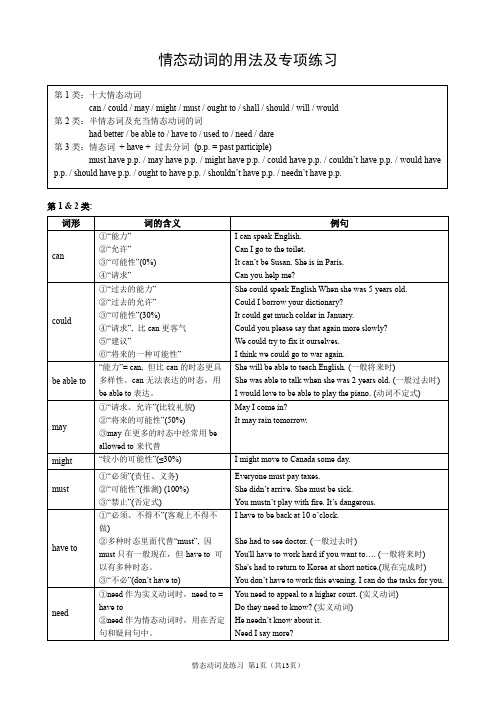
情态动词的用法及专项练习第1 & 2类:第3类:1.could have p.p.①指过去某事有可能发生, 但并未.真的..发生。
They could have won the race, but they didn't try hard enough.He could have studied harder, but he was too lazy and that's why he failed the exam.②指过去有能力做某事, 但并未真的...做过。
I could have stayed up late, but I decided to go to bed early.Julie could have bought the book, but she borrowed it from the library instead.③对过去的发生事情做出一种猜测,但实际上并不知道真假。
仅仅是做一种观点上的表达。
He could have got stuck in traffic.He could have forgotten that we were meeting today.He could have overslept.2. may / might have p.p.(用法与could have p.p.第③点相同)对过去的发生事情做出一种猜测,但实际上并不知道真假。
仅仅是做一种观点上的表达。
He might have got stuck in traffic.He might have forgotten that we were meeting today.He might have overslept.3. couldn't have p.p.渴望、期望做某事, 但由于外部原因不可能做成, 即便是很想做。
是一种虚拟语气。
I couldn't have arrived any earlier. There was a terrible traffic jam (= it was impossible for me to have arrivedany earlier).He couldn't have passed the exam, even if he had studied harder. It's a really, really difficult exam.4. should / ought to have p.p.有一个好主意,该做而没有做。
英语情态动词含答案解析
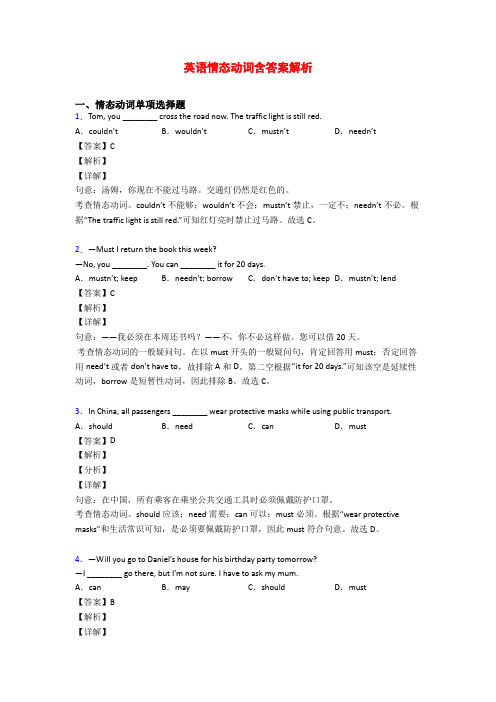
英语情态动词含答案解析一、情态动词单项选择题1.Tom, you ________ cross the road now. The traffic light is still red.A.couldn’t B.wouldn’t C.mustn’t D.needn’t【答案】C【解析】【详解】句意:汤姆,你现在不能过马路。
交通灯仍然是红色的。
考查情态动词。
couldn’t不能够;wouldn’t不会;mustn’t禁止,一定不;needn’t不必。
根据“The traffic light is still red.”可知红灯亮时禁止过马路。
故选C。
2.—Must I return the book this week?—No, you ________. You can ________ it for 20 days.A.mustn’t; keep B.needn’t; borrow C.don’t have to; keep D.mustn’t; lend【答案】C【解析】【详解】句意:——我必须在本周还书吗?——不,你不必这样做。
您可以借20天。
考查情态动词的一般疑问句。
在以must开头的一般疑问句,肯定回答用must;否定回答用need’t或者don’t have to,故排除A和D。
第二空根据“it for 20 days.”可知该空是延续性动词,borrow是短暂性动词,因此排除B。
故选C。
3.In China, all passengers ________ wear protective masks while using public transport. A.should B.need C.can D.must【答案】D【解析】【分析】【详解】句意:在中国,所有乘客在乘坐公共交通工具时必须佩戴防护口罩。
考查情态动词。
should应该;need需要;can可以;must必须。
根据“wear protective masks”和生活常识可知,是必须要佩戴防护口罩,因此must符合句意。
英语情态动词题20套(带答案)及解析
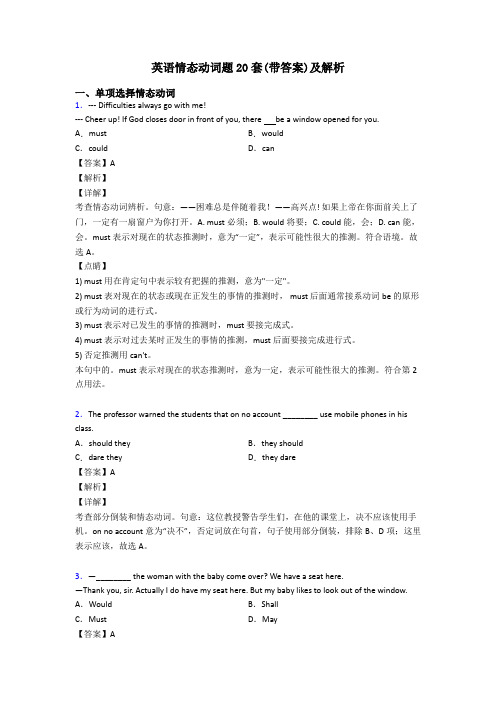
A.shallB.must
C.canD.should
【答案】D
【解析】
【详解】
考查情态动词。句意:我仍然难以想象这样聪明的孩子竟然犯这样愚蠢的错误。should作为情态动词,可以用来表示意外、惊喜或者在说话人看来是不可思议的,常常译为"竟会"、"居然",这么聪明的孩子竟然犯这样愚蠢的错误。表示意外,shall表示允诺,命令等,must表示必须,can表示能力及可能性。所以答案选D。
【答案】B
【解析】
试题分析:考查情态动词用法。Shouldn’t have done本不应该做某事,实际上却做了(虚拟语气);couldn’t have done不可能做某事(对过去情况的推测);needn’t have done本不需要做某事,实际上却做了(虚拟语气);句意:我的姐姐昨天下午在街上遇见了他,所以他不可能去听了你的演讲。故B正确。
3. shall用于第一、第三人称疑问句中,表示说话人征求对方的意见或向对方请示。如:Shall we begin our lesson? When shall he be able to leave the hospital?
4. shall用于第二、第三人称,表示说话人给对方命令、警告、允诺或威胁。如:You shall fail if you don't work harder.(警告)He shall have the book when I finish reading.(允诺)He shall be punished.(威胁)
- 1、下载文档前请自行甄别文档内容的完整性,平台不提供额外的编辑、内容补充、找答案等附加服务。
- 2、"仅部分预览"的文档,不可在线预览部分如存在完整性等问题,可反馈申请退款(可完整预览的文档不适用该条件!)。
- 3、如文档侵犯您的权益,请联系客服反馈,我们会尽快为您处理(人工客服工作时间:9:00-18:30)。
人教版英语英语情态动词单元测试题(含答案)含答案百度文库一、初中英语情态动词1.—Could you go to the bookshop with me? I want to buy The Grass House by Cao Wenxuan.—Sorry, I . I've promised Mum to go home right after school.A. can'tB. couldn'tC. needn'tD. mustn't【答案】 A【解析】【分析】句意:—你能和我去书店吗?我想买一本曹文轩写的《草房子》。
—对不起,我不能去。
我答应我妈妈放学后直接回家了。
在问句中的could表示委婉语气,不是过去式,所以回答时用can't,不能;needn't 不需要;mustn't一定不要,千万别。
结合句意,故选A。
【点评】考查情态动词,回答could提问的时候应使用can。
2.—How amazing this robot is!—Wow, it has video cameras in its eyes, so it “see” and interact with people.A. mayB. canC. mustD. should【答案】 B【解析】【分析】句意:—这个机器人多么惊人啊!—哇,在它的眼睛里有摄像机,因此它能看见和人打交道。
A. may 可以,可能;表示许可,B. can 能;表示能力,C. must 必须;D. should应该;根据it has video cameras in its eyes,可知是有能力看见,故选B。
【点评】考查情态动词辨析。
熟记情态动词的含义和用法。
3.A hard-working man ______ become a great scientist, but a great scientist _______ be a hard-working man.A. can't; canB. may not; mustC. can't; mustD. may not; can【答案】 B【解析】【分析】句意:一个勤奋的人可能不会成为一位伟大的科学家,但是一位伟大的科学家一定是一个勤奋的人。
can't不可能,不会;can可能,能,会;may not 可能不;must 必须,一定;结合句意,可知,第一个空为“可能不”,第二个空为“一定”,故答案为B。
【点评】考查情态动词。
掌握情态动词表推测时的意义和用法。
4.Look at the sign! It says “No Smoking!” You ________ smoke here. It's dangerous.A. mustn'tB. ought not toC. needn'tD. don't have to【答案】 A【解析】【分析】句意:看这个标志!上面写道“禁止吸烟!“你不能抽烟。
这是危险的。
A.mustn't 禁止,不允许;B.ought not to不应该,不应当;C.needn't不必;D.don't have to 不必。
根据“No Smoking!”可知此处禁止吸烟,故答案为A。
【点评】考查情态动词。
掌握情态动词的意义和用法。
5.Teenagers allowed to drive .A. should not beB. should be notC. not should be【答案】A【解析】【分析】句意:年轻人不应该被允许驾车。
Should是情态动词,其否定表达一般在在后面加副词not,故选A。
【点评】此题考查含有情态动词的被动语态的否定形式。
平时注意记忆情态动词的记忆和用法。
6.You be tired after walking for such a long time. Sit down and have a rest.A. canB. can'tC. mustn'tD. must【答案】 D【解析】【分析】句意:走了这么长时间你一定很累了。
坐下休息一下吧。
can能,能够,can't不能,对事物进行否定推测;mustn't一定不是,禁止,must一定,对事物进行肯定推测,根据after walking for such a long time,可以肯定你一定很累,所以是进行肯定推测,情态动词使用must,故选D。
【点评】此题考查情态动词。
弄清每个情态动词的使用规则,根据句意确定所使用的情态动词。
7.—Where is Mom now?—I'm not sure. She _________ be in the kitchen.A. shallB. mayC. needD. must【答案】 B【解析】【分析】句意:—妈妈现在在哪里?—我不确定,她也许在厨房。
A. shall 将要; B. may 可以,可能; C. need 需要; D. must必须,一定;根据I'm not sure可知是不确定;故选B。
【点评】此题考查情态动词表推测的用法。
8.— Is this e-dictionary Jack's?— No, it_______ his. His is much newer.A. can't beB. mustn't beC. may beD. should be【答案】 A【解析】【分析】句意:-这个电子字典是杰克的吗?--不可能是他的,他的更新些。
must,can(could),may(maight)可以表示猜测,must表示肯定猜测,用于肯定句,肯定……,一定……;can’t,表示否定猜测,肯定不……,另外can(could),may(maight),表示可能性猜测,可能……。
根据后文的依据,可知是否定猜测,故选A9.—Who it be that is knocking at the door?—It be father, but I'm not sure.A. call; mustB. can; mayC. must; canD. may; must【答案】 B【解析】【分析】句意:——敲门的人可能是谁呢?——他可能是父亲,但是我不确定。
第一空,can可能,表猜测用语疑问句形式,may是表可能;第二空,根据后面的but I'm not sure,可知表示不确定的猜测,应填may,故选B。
【点评】此题考查情态动词辨析。
先弄清每个情态动词的使用规则。
根据上下文的联系确定情态动词的使用。
10.I can't go with you. I _______ stay at home until my parents come back.A. canB. mayC. mustD. could【答案】 C【解析】【分析】句意:我不能和你一起去。
我必须呆在家直到我父母回来。
A. can能,表示能力;B. may可以,表示许可;C. must必须,强调主观愿望;D. could可以,表示允许、请求。
父母没回来前,我必须待在家。
故选C。
【点评】此题考查情态动词的用法。
11.We don't allow taking magazines out, but you ____________ copy the article you need on the machine over there.A. canB. mustC. shouldD. would【答案】 A【解析】【分析】句意:我们不允许把杂志带出去,但是你可以在那里抄下你需要的文章。
can能,能够,可以;must必须;should应该;would将;此处表示可以,允许,故选A。
【点评】此题考查情态动词辨析。
弄清每个情态动词的使用规则,根据上下文的联系确定所使用的情态动词。
12.You _____ walk too close to the edge of the path because you might fall and hurt yourself.A. mayB. mightC. needn'tD. musn't【答案】 D【解析】【分析】句意:你不能走得太靠近路的边缘,因为你可能跌倒伤害自己。
A. may可以,表允许;B. might可能,表推测;C. needn't不必,指没有必要;D. musn't不能,表示不允许或禁止。
根据句意语境,本句是不允许离路边太近,故选D。
【点评】考查情态动词辨析题。
注意分析句意和词义。
13.—He be in the classroom,I think.—No, he be in the classroom. I saw him go home a minute ago.A. can; may notB. must; may notC. may; mustn'tD. may; can't 【答案】 D【解析】【分析】句意:——我认为他可能在教室里。
——不,他肯定没有在教室里,我刚才看到他回家了。
must,can(could),may(might)可以表示猜测,must表示肯定猜测,用于肯定句,肯定……一定……;can't表示否定猜测,肯定不……,另外can(could),may (might),表示可能性猜测,可能……根据I think,可知把握较小,根据I saw him go home a minute ago.可知第二句把握大,故选D。
14.We __________ pay to get into the concert. It's free.A. can'tB. mustn'tC. might notD. don't have to【答案】 D【解析】【分析】句意:我们进入音乐会不必付钱。
这是免费的。
A.can"t 不可能; B. mustn"t 禁止; C.might not 可能不;D. don"t have to不必。
根据It's free.可知音乐会是免费的,因此不必付钱。
故选D。
15.— Dick, ________ I use your e-dictionary? — Yes, sure. ________ you give it to David after you use it?A. will; WouldB. may; MightC. can; CouldD. shall; Should【答案】 C【解析】【分析】句意:一Dick我可用一下你的电子词典吗?一当然可以。
